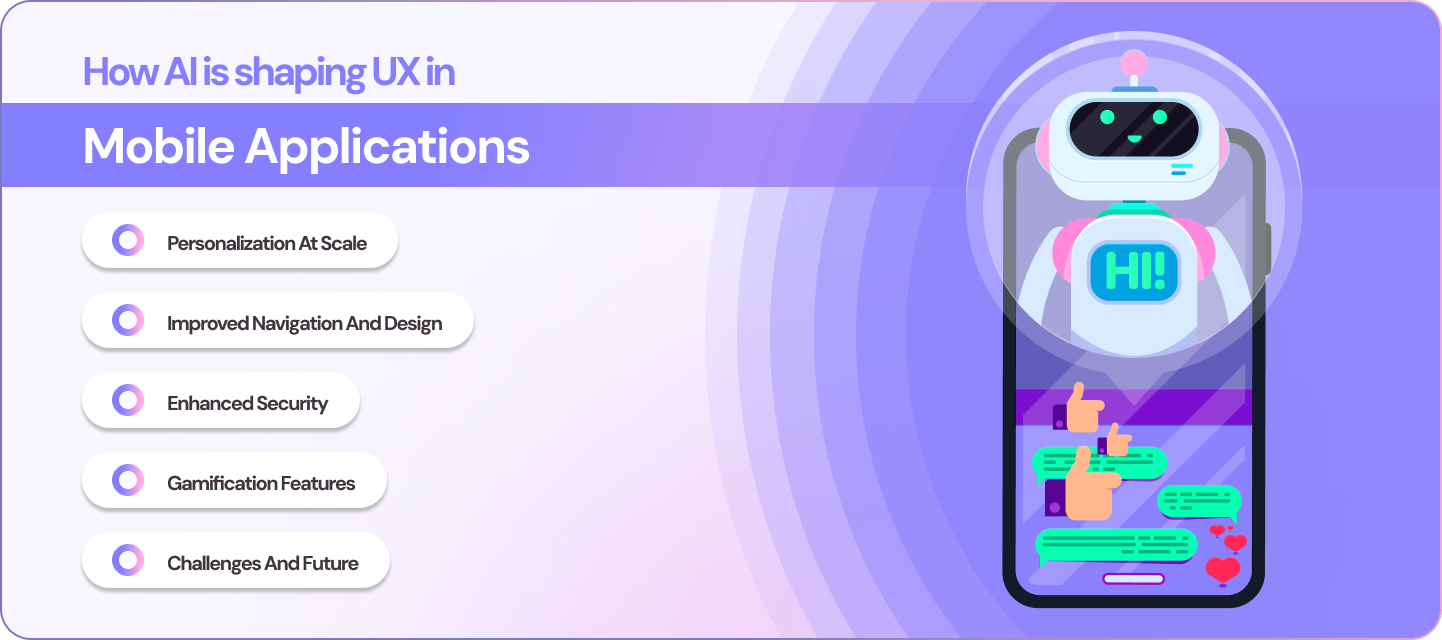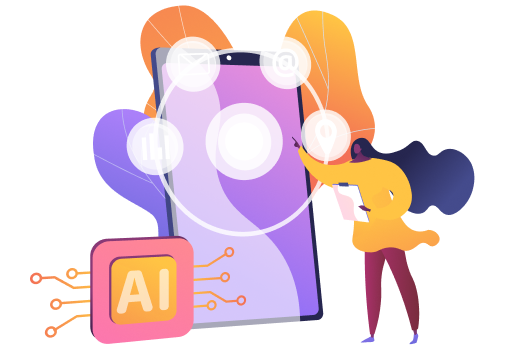How AI is Shaping User Experience in Mobile Applications
Artificial intelligence has been one of the transforming trends in recent years, defining user interactions with technology in new ways. Its ability to analyze data, predict users’ behavior, and personalize an experience makes it a supporting element of user experience (UX) design in mobile applications. The development of custom software development and mobile app development services has found AI as a tool to develop more intelligent, intuitive, and user-friendly applications.

The importance of user experience in mobile applications.
User experience is what makes or breaks any mobile application. In a competitive marketplace, users lean toward an app that is intuitive, responsive, and user-centered. Mobile application development companies know that a UX of the best quality is required for staying engaged in customer interests. AI is really helping out with enhancing these experiences through powerful solutions tailored according to individual tastes.
Key AI Technologies Transforming Mobile App UX
Personalization at Scale AI-powered algorithms analyze user behavior, preferences, and historical data to provide personalized recommendations. For instance, streaming platforms such as Netflix and Spotify make use of AI in suggesting movies or music tailored to the taste of the user. Similarly, e-commerce apps apply the use of AI in product recommendation based on browsing history, thus making shopping experiences seamless and enjoyable. Custom software development has, through personalization, become a non-negotiable aspect, thus ensuring that each user feels uniquely catered to.
Voice Assistants and Chatbots Voice assistants are AI-driven assistants like Siri, Alexa, and Google Assistant, which have revolutionized mobile interactions. These assistants use NLP in understanding and responding to user queries, thus performing tasks as simple as setting reminders or searching for information quite efficiently.
On the other hand, chatbots improve customer support in mobile applications. Instant responses to queries by chatbots cut down waiting time and gradually enhance satisfaction levels, which remains an important focus area for mobile application development services.
Predictive Analytics Predictive analytics, driven by AI, enables applications to predict the requirement even before it arises. A fitness app may thus offer working-out ideas, suggested by predictive analytics based on past activity data, while a financial app sends investment advice tailored to a user’s goals. Businesses can create mobile apps in custom software development that can proactively address the requirements of users, leading to increased trust and loyalty.
Improved Security App security has had a tremendous enhancement over the years due to AI. Biometric authentication, anomaly detection, fraud prevention, and more have become integral features in mobile apps. AI learns continuously to pick out patterns of data to identify new threats early enough and fight them, thus providing safety for users. Mobile app development companies must increasingly use AI-driven security components to achieve user confidence.
Augmented Reality (AR) and AI Integration
The integration of AI and AR forms immersive experiences in gaming, retail, and educational mobile apps. AI amplifies the effectiveness of AR through the creation of more realistic, responsive virtual interactions. Thus, an app such as IKEA Place uses AI-driven AR to let users envision furniture within their homes before making a buy. Innovations like this one highlight why customized software development is becoming crucial for developing contemporary mobile applications.
AI’s Role in Streamlining App Design and Navigation
AI simplifies the design process, analyzing user behavior to suggest optimal layouts and features. Using A/B testing and heatmaps, AI identifies the elements best appreciated by the users, as well as those that need improvement. This iterative approach ensures apps evolve according to user expectations. For mobile app development service providers, businesses, leveraging AI in application design, provides intuitive and aesthetics-friendly interfaces.
Voice-enabled navigation, powered by AI, is another game-changer. Users can now interact with apps hands-free, a feature that enhances accessibility for individuals with disabilities. By integrating voice navigation during the custom software development phase, developers can broaden the app’s usability.
AI and Hyper-Personalized Marketing in Mobile Apps
Another significant transform in AI has also been in marketing within mobile applications. Push notifications, targeted ads, and promotional offers are now designed with respect to user behavior. For instance, ride sharing applications like Uber makes use of AI to determine peak hours and send messages about discounts or surge price. That kind of level of personalization that mobile app development service facilitates, elevates engagement levels among users and generates revenues.
The Role of AI in User Feedback and Continuous Improvement
The AI-based sentiment analysis tool takes in user reviews and feedbacks and derives recurrent themes or pain points. The real-time analysis could cater to problems promptly, and, thereby, improve the app continuously. With AI tools in custom software development, the apps will be dynamic and responsive to users’ needs, thus increasing their long-term value.
AI-Powered Gamification in Mobile Applications
Badges, leaderboards, and rewards are just among the gamification elements that can be used to enhance user engagement. AI takes gamification a notch higher by analyzing user preferences then adjusts challenges to keep a user engaged. For example, health and wellness applications use AI to create personalized fitness goals and reward users for achieving milestones. One benefit of gamification to developers is that it can ensure the creation of apps that do not only attract but hold the users.
Challenges and Ethical Considerations
Whilst AI holds much promise, it also poses challenges. Critical challenges include privacy concerns, data security, and the potential for algorithmic bias. Companies who promise mobile app development services need to ensure transparency over their use of data and practices that are ethically correct. With responsible AI development, developers can work towards building trust with the user as they produce exceptional experiences.
The Future of AI in Mobile App UX
One of the early, promising areas concerning mobile applications is AI integration. The potential in this area is seemingly endless, but from translation in real-time to emotion recognition and way beyond, it’s sure to change the user experience going forward. Companies specializing in custom software development and mobile app development services have to stay ahead of these trends to be competitive.
One new trend includes generative AI to generate dynamic content in apps. It can generate personalized messages, images or even video content according to user preferences. For instance, generative AI could be used to create personalized lesson plans for e-learning apps, changing the game when it comes to interacting with educational material.
Another exciting area is AI-driven edge computing. Edge computing reduces latency and enhances real-time performance of apps by processing data locally on devices. This innovation will be quite pertinent in gaming, AR, and IoT applications where speed and responsiveness are fundamental.
Conclusion
AI has really become a necessity for creating great user experiences in mobile applications. Through personalization, security enhancement, and simplification in the design of applications, AI makes apps not only functional but wonderful to use. Many mobile app development companies are utilizing AI in creating applications that meet the dynamic demands of users. The same holds true for custom software development, where the incorporation of AI enables delivery of solutions tailored to clients, driving innovation across industries.
The impact of AI in mobile app UX will only grow as it continues to advance; therefore, the opportunities to enhance user satisfaction will be new. Businesses can create unique, successful mobile applications in the competitive market by embracing AI responsibly and innovatively.
TABLE OF CONTENT
- How AI is Shaping User Experience in Mobile Applications
- The importance of user experience in mobile applications
- Key AI Technologies Transforming Mobile App UX
- Augmented Reality (AR) and AI Integration
- AI’s Role in Streamlining App Design and Navigation
- AI and Hyper-Personalized Marketing in Mobile Apps
- The Role of AI in User Feedback and Continuous Improvement
- AI-Powered Gamification in Mobile Applications
- Challenges and Ethical Considerations
- The Future of AI in Mobile App UX
- Conclusion
